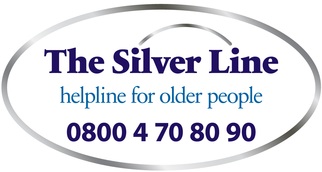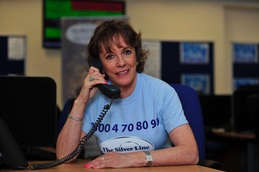The Silver Line celebrates first birthday by partnering with CQC
 Free and confidential helpline, The Silver Line is today celebrating its first birthday by announcing a new partnership with the Care Quality Commission (CQC).
Free and confidential helpline, The Silver Line is today celebrating its first birthday by announcing a new partnership with the Care Quality Commission (CQC).
Since launching on 25 November 2013, The Silver Line has received nearly 300,000 calls in its first year with loneliness being cited as the most common reason for calling, with 54 per cent admitting that they had no one else to talk to.
Sophie Andrews, chief executive officer of The Silver Line said: “Silver Line has been described as ChildLine for Older People and we are delighted to mark our first birthday, with this life-saving new partnership.
“We will work jointly with the CQC to help older people and their families raise concerns about the standard of care they are receiving whether in a care home or in their own homes.
“We believe that older people should be cherished and valued and I’m particularly proud that some of our early callers have now trained as volunteer Silver Line Friends and Silver Circle facilitators, and are providing friendship to others. It has been a busy year but we’ve managed to answer every call with a friendly human voice.”
Information published by the Office for National Statistics in 2013 revealed that almost 50 per cent of over 80s said they felt lonely often, compared to one third of people aged over 52.
The Silver Line was launched as part by the Big Lottery Fund in 2013 and now the charity relies on donations from the public to cover the cost of calls received each day.
The new partnership by The Silver Line and the CQC hopes to encourage older people who are cared for within their own homes or residential care to call and seek help allowing the CQC to identify any issues with care and encourage good practice.
When speaking about the new partnership, Andrea Sutcliffe, chief inspector of adult social care at the CQC said: “I am very pleased that the Care Quality Commission will be working in partnership with The Silver Line to reach the most isolated older people who are receiving care and may need our support and protection. It is also an opportunity to recognise examples of excellence and to highlight best practice to share with others.”
Over 850 people have so far volunteered to become Silver Line Friends, offering a befriending service to more than 1000 older people.
 The Silver Line has established a system for conference calling people who want to talk in a group setting called Silver Circle and Silver Letters offering handwritten letters to people who may have a visual impairment or like to receive handwritten letters.
The Silver Line has established a system for conference calling people who want to talk in a group setting called Silver Circle and Silver Letters offering handwritten letters to people who may have a visual impairment or like to receive handwritten letters.
Founder and president of The Silver Line, Esther Rantzen, said: “We knew loneliness existed in this country, but the extent of this epidemic of loneliness and isolation suffered by people over 65 has shocked and alarmed us. Many of our callers ring us on a regular basis because they tell us we are the reason they can get through the day.
The Silver Line currently makes 1,000 extra phone calls per week to older people who have called and requested a Silver Line Friend.
Of all calls received by The Silver Line within the last year, 88 per cent of people said that they had called because they lived alone and 60 per cent of all callers were female.
As a result of such high call volume, the helpline is requesting that people become Silver Line Friends if they are working from home and can spare an hour a week to offer friendship to an older person as many can go for days and weeks without social interaction.
Speaking about its success, chairman of The Silver Line, Patrick Geoghegan says: “It is shocking that older people tell us they are not frightened of dying but they are frightened of dying and not being found. They tell us at least with our weekly calls they know someone will notice if they do not answer, and they also know that someone cares about them.
“The Silver Line, like the best ideas is a simple one. By offering friendship by phone and letter, it has proved to be a lifeline for literally thousands of the most isolated and vulnerable older people in our society.”
Latest News
 29-Jul-24
Dementia Bus gives carehome.co.uk staff insight into life with dementia
29-Jul-24
Dementia Bus gives carehome.co.uk staff insight into life with dementia
 01-Mar-24
Find out the top care homes in 2024
01-Mar-24
Find out the top care homes in 2024
 21-Mar-23
UK's top care homes in 2023 revealed
21-Mar-23
UK's top care homes in 2023 revealed
 03-Jan-23
carehome.co.uk launches free care helpline
03-Jan-23
carehome.co.uk launches free care helpline
 13-Dec-22
5 mins with Emily Whitehurst, chief operating officer for Constantia Healthcare
13-Dec-22
5 mins with Emily Whitehurst, chief operating officer for Constantia Healthcare